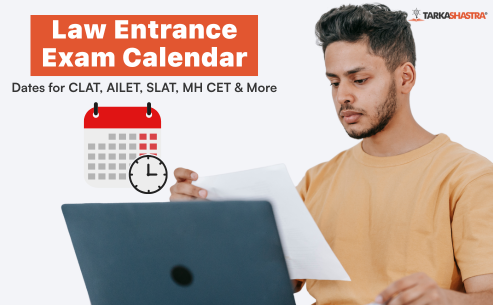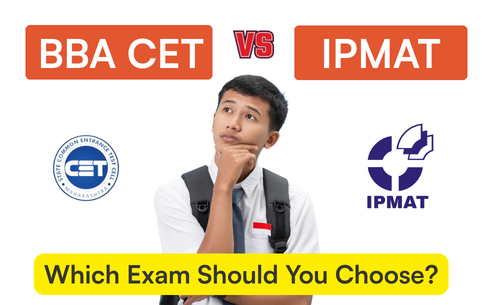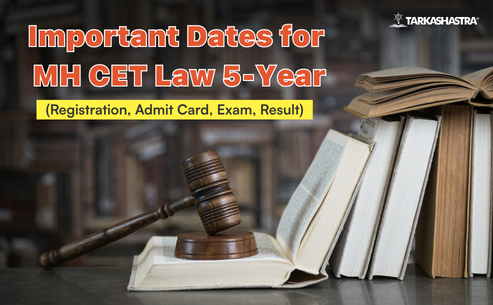Law Entrance Exams 2026 – The Road to Top Law Schools in India
Choosing a career in law is more than just earning an LLB degree — it’s about developing the power to interpret, influence, and uphold justice in every sphere of life.
For thousands of aspirants across India, the year 2026 will mark another competitive yet rewarding journey through a series of law entrance exams that open the gates to prestigious institutions such as NLUs, Symbiosis Law School, GLC Mumbai, and many more.
With multiple exams conducted by different authorities and timelines often overlapping, aspirants frequently struggle to track all the notifications, form deadlines, and exam dates.
That’s where a comprehensive law entrance exam calendar 2026 becomes indispensable.
In this detailed guide, you’ll find:
- All important dates for CLAT, AILET, SLAT, and MH CET Law (3-Year & 5-Year)
- Exam-wise timelines — registration, admit cards, results, counselling
- Eligibility highlights and preparation pointers
- Expert mentorship insights from Tarkashastra, one of India’s most trusted institutes for law entrance coaching
Why Knowing the Law Entrance Exam Calendar Matters
Planning early is the first step toward success in any competitive exam.
A well-structured preparation strategy depends on how efficiently you align your study plan with official timelines.
Here’s why tracking the law entrance exam dates 2026 can give you a major advantage:
| Exam | Full Form | Level | Conducting Body |
| CLAT 2026 | Common Law Admission Test | National | Consortium of NLUs |
| AILET 2026 | All India Law Entrance Test | National | NLU Delhi |
| MH CET Law 5-Year 2026 | Maharashtra Common Entrance Test for Law (5 Years) | State | CET Cell Maharashtra |
| MH CET Law 3-Year 2026 | Maharashtra Common Entrance Test for Law (3 Years) | State | CET Cell Maharashtra |
| SLAT 2026 | Symbiosis Law Admission Test | National | Symbiosis International University |
Tarkashastra Insight:
Most 2026 law entrance exams will open applications between July 2025 and January 2026.
Keeping an updated calendar and subscribing to official alerts ensures you never miss a crucial deadline.
Law Entrance Exam Calendar 2026 (At a Glance)
Law aspirants often juggle multiple entrance exams within a tight window between December 2025 and June 2026. To help you stay organised, here’s a concise, updated table summarising the most relevant exam timelines, conducting authorities, and official websites for easy reference.
Complete Law Entrance Exam Calendar 2026
| Exam | Conducting Body | Level | Application Window (Tentative) | Exam Date (Tentative) | Official Website |
| CLAT 2026 | Consortium of NLUs | National | July – Oct 2025 | 7th Dec 2025 (Offline) | consortiumofnlus.ac.in |
| AILET 2026 | National Law University Delhi | National | June – Nov 2025 | 14th Dec 2025 (Offline) | nationallawuniversitydelhi.in |
| MH CET Law 5-Year 2026 | CET Cell Maharashtra | State | Jan – Mar 2026 | April 2026 (Online) | cetcell.mahacet.org |
| MH CET Law 3-Year 2026 | CET Cell Maharashtra | State | Dec 2025 – Mar 2026 | May 2026 (Online) | cetcell.mahacet.org |
| SLAT 2026 | Symbiosis International (Deemed University) | National | Aug 2025 – Nov 2025 | December 2025 (Test 1 – Dec 20th & Test 2 – Dec 28th) | set-test.org |
Note: Exact exam dates for 2026 will be confirmed once official notifications are released. The above schedule is based on previous exam cycles (2024 & 2025) to help students plan ahead.
How to Use This Calendar Effectively?
| Step | Action Point | Purpose |
| Mark Dates Early | Add tentative timelines in a personal calendar / planner. | Build long-term consistency. |
| Track Official Updates | Check the official sites listed above weekly. | Stay aware of notification releases. |
| Plan Mock Schedules | Align mock tests with each exam’s expected month. | Simulate real exam pressure. |
| Prioritize Overlap Exams | Note CLAT & AILET fall close together. | Optimize preparation accordingly. |
| Stay Alert via Tarkashastra | Follow Tarkashastra’s law exam updates portal. | Receive verified alerts instantly. |
Tarkashastra Tip: Subscribe to Tarkashastra’s Law Exam Alerts newsletter to get real-time notifications about form releases, admit cards, and result updates for all major law entrance tests in 2026.
CLAT 2026 ( Common Law Admission Test )
What is CLAT UG 2026?
The Common Law Admission Test (CLAT UG 2026) is a national-level law entrance examination conducted by the Consortium of National Law Universities (NLUs) for admission to five-year integrated undergraduate law programs such as BA LLB (Hons), BBA LLB, and BCom LLB.
It serves as the primary gateway to 26 NLUs, including prestigious institutions like NLSIU Bengaluru, NALSAR Hyderabad, WBNUJS Kolkata, and NLU Jodhpur, along with many leading private law colleges that also accept CLAT scores.
Conducted offline (pen-and-paper), CLAT UG 2026 evaluates a candidate’s comprehension, reasoning, and analytical skills through five sections—English Language, Current Affairs (including GK), Legal Reasoning, Logical Reasoning, and Quantitative Techniques.
With nearly 60,000 aspirants competing annually, CLAT is widely regarded as India’s most competitive law entrance exam.
CLAT 2026 – Important Dates (Tentative)
| Event | Tentative Date |
| Release of Official Notification | July 2025 |
| Application Form Opens | 1 August 2025 |
| Last Date to Apply | 31 October 2025 |
| Admit Card Availability | Till exam date |
| CLAT 2026 Exam Date | 7 December 2025 (Sunday) |
| Provisional Answer Key | 7 December 2025 |
| Final Result & Merit List | Mid-December 2025 |
| Counselling Rounds Begin | December 2025 / January 2026 |
Tarkashastra Tip: Start your CLAT UG preparation at least 10–12 months before the exam to cover both conceptual clarity and mock test strategy effectively.
Eligibility Criteria for CLAT UG 2026
| Parameter | Details |
| Educational Qualification | Passed Class 12 or equivalent from a recognized board |
| Minimum Marks Required | General/OBC/PWD/NRI/PIO/OCI – 45% • SC/ST – 40% |
| Appearing Students | Class 12 students appearing in 2026 are eligible (provisional admission) |
| Age Limit | No upper age limit |
| Nationality | Indian Nationals / NRIs / PIO / OCI eligible |
Note: Candidates must submit valid category or domicile certificates where applicable. Admission is provisional until Class 12 marks are verified.
CLAT 2026 Exam Pattern (UG)
| Parameter | Details |
| Mode of Exam | Offline (Pen and Paper – OMR) |
| Duration | 120 minutes |
| Type of Questions | Multiple Choice Questions (MCQs) |
| Total Questions | 120 |
| Total Marks | 120 |
| Marking Scheme | +1 for correct • –0.25 for incorrect |
| Language of Paper | English |
CLAT 2026 Syllabus (UG)
| Section | Focus Areas & Topics |
| English Language | Reading comprehension from fiction / non-fiction / editorials, grammar, contextual vocabulary, inference, summarization. |
| Current Affairs & GK | National and international news (Apr 2024 onwards), awards, summits, arts & culture, science & tech, important legal events. |
| Legal Reasoning | Comprehension of passages on laws or public policy, legal principles from contracts, torts, criminal and constitutional law. |
| Logical Reasoning | Argument analysis, assumptions, inference, analogies, logical sequencing, critical reasoning passages. |
| Quantitative Techniques | Basic math (≤ Class 10 level): percentages, ratios, profit-loss, time-work, mensuration, data interpretation. |
CLAT 2026 Application Fee
| Category | Fee (INR) |
| General / OBC / PWD / NRI / PIO / OCI | ₹ 4,000 |
| SC / ST / BPL | ₹ 3,500 |
Additional ₹ 500 may apply for purchasing previous years’ question papers. Always apply before the deadline to avoid portal traffic.
AILET 2026 (All India Law Entrance Test)
What is AILET UG 2026?
The All India Law Entrance Test (AILET UG 2026) is a national-level entrance exam conducted exclusively by the National Law University, Delhi (NLU Delhi) for admission to its five-year BA LLB (Hons.) program.
Unlike CLAT, which is accepted by multiple NLUs, AILET is the sole gateway to NLU Delhi, making it one of the most competitive law entrance exams in India.
The test is conducted offline (pen-and-paper) in over 35 cities across India. It assesses candidates’ aptitude in English Language, Current Affairs, including General Knowledge, and Logical Reasoning.
With only ~120 UG seats and 60,000+ aspirants, AILET demands precision, speed, and conceptual clarity to secure a top rank.
AILET 2026 – Important Dates
| Event | Important Dates |
| Release of Official Notification | 17 June 2025 |
| Application Form Opens | 7 August 2025 |
| Last Date to Apply | 10 November 2025 |
| Admit Card Release | Last Week of November 2025 |
| AILET 2026 Exam Date | 14 December 2025 (Sunday) |
| Provisional Answer Key Release | Within 2–3 days after exam |
| Result Declaration | Last Week of December 2025 |
| Counselling Begins | January 2026 (Onwards) |
Tarkashastra Tip: Set reminders for form deadlines and mock-test milestones. Early preparation—ideally 6–8 months before the exam—ensures mastery over lengthy logical reasoning sets.
Eligibility Criteria for AILET UG 2026
| Parameter | Details |
| Educational Qualification | Passed or appearing in Class 12 (10+2) from a recognized board |
| Minimum Marks Required | General – 45% • OBC – 42% • SC/ST/PwD – 40% |
| Age Limit | No upper age limit (as per Supreme Court ruling) |
| Foreign Nationals | Must have 65% in Class 12 or equivalent (Exempt from AILET) |
| Appearing Students | Class 12 students appearing in 2026 are eligible (provisional admission) |
Candidates must produce original documents at admission time. Failure to meet minimum marks will result in cancellation of the seat even after qualification.
AILET 2026 Exam Pattern (UG)
| Parameter | Details |
| Mode of Exam | Offline (Pen and Paper – OMR based) |
| Duration | 120 minutes |
| Type of Questions | Multiple Choice Questions (MCQs) |
| Total Questions / Marks | 150 Questions / 150 Marks |
| Marking Scheme | +1 for each correct • –0.25 for incorrect answers |
| Medium of Paper | English |
| Sections Included | English Language, Current Affairs & GK, Logical Reasoning |
AILET 2026 Syllabus (UG)
| Section | Focus Areas & Topics |
| English Language | Reading Comprehension (passages 400–450 words), Grammar, Vocabulary (synonyms/antonyms), Sentence Rearrangement, Idioms & Phrases. |
| Current Affairs & GK | National & International events (12 months prior), Legal and Constitutional developments, Awards & Honours, Sports, Government Schemes. |
| Logical Reasoning | Analytical reasoning, Critical thinking, Puzzles, Series & Patterns, Blood Relations, Syllogisms, Statement-based questions, Strong/Weak Arguments, Assumptions & Inferences. |
AILET 2026 Application Fee
| Category | Fee (INR) |
| General / OBC / EWS / Foreign / OCI / PIO | ₹ 3,000 |
| SC / ST / PwD | ₹ 1,000 |
| SC/ST (BPL Category) | Nil (₹ 0) |
Tarkashastra Note: Avoid last-minute submissions and double-check uploaded documents. Corrections after submission are allowed only during the official window.
MH CET Law 2026 (5-Year LLB): (Maharashtra Common Entrance Test)
What is MH CET Law (5-Year LLB) 2026?
The Maharashtra Common Entrance Test for Law (5-Year LLB) is a state-level entrance exam conducted by the State Common Entrance Test Cell, Maharashtra, for admission into integrated BA LLB / BBA LLB / BCom LLB programs across government, aided, and private colleges in the state.
Over 25,000 students appear each year to compete for nearly 10,000 law seats in prestigious institutions like Government Law College (GLC Mumbai) and ILS Law College Pune.
The exam is held online (CBT) in English and Marathi, testing aspirants’ aptitude in Legal Reasoning, Logical Reasoning, General Knowledge, English, and Basic Mathematics.
With no negative marking and a balanced section-wise structure, MH CET Law (5-Year) 2026 is a crucial gateway for students aspiring to begin their law journey right after Class 12.
MH CET Law 2026 – Important Dates (Tentative)
| Event | Tentative Date |
| Application Form Release | First Week of January 2026 |
| Last Date to Apply | Last Week of March 2026 |
| Admit Card Availability | One Week before Exam |
| Exam Date | Last Week of April 2026 |
| Answer Key Release | Within two weeks of exam |
| Result Declaration | First Week of June 2026 |
| Counselling & Seat Allotment (CAP) | Within three weeks after result |
Tarkashastra Tip: Apply early and mark the exam window. Many students miss deadlines due to CET Cell portal congestion in March—avoid last-minute rushes.
Eligibility Criteria for MH CET Law (5-Year LLB) 2026
| Parameter | Details |
| Educational Qualification | Passed Class 12 or equivalent from a recognized board |
| Minimum Marks Required | General – 45% • OBC / VJNT / SBC – 42% • SC / ST – 40% |
| Appearing Students | Class 12 students appearing in 2026 eligible (provisional admission) |
| Age Limit | No upper age limit (As per DHE Maharashtra rules) |
| Domicile Preference | Maharashtra state students get reservation as per government norms |
Ensure you upload valid caste and domicile certificates during application submission — no correction window is available later.
MH CET Law (5-Year LLB) 2026 – Exam Pattern
| Section | No. of Questions | Marks |
| Legal Aptitude & Legal Reasoning | 32 | 32 |
| Logical & Analytical Reasoning | 32 | 32 |
| General Knowledge & Current Affairs | 24 | 24 |
| English Language | 24 | 24 |
| Basic Mathematics | 8 | 8 |
| Total | 120 | 120 Marks |
Key Highlights:
- Duration: 2 hours (120 minutes)
- Type: MCQs – 1 mark each
- No Negative Marking
- Conducted online in English and Marathi
Tarkashastra Note: Prioritize Legal Aptitude and Logical Reasoning—they collectively make up more than 50% of the paper.
MH CET Law 2026 Syllabus (5-Year LLB)
| Section | Key Topics to Focus On |
| Legal Aptitude & Reasoning | Constitutional Law, Law of Torts, Contract Law, IPC basics, legal maxims, terminology, and landmark judgments. |
| General Knowledge & Current Affairs | National & International events, Politics, Economy, Science & Technology, Sports, Awards. |
| Logical & Analytical Reasoning | Series, Analogies, Seating Arrangements, Syllogisms, Pattern Recognition, Critical Thinking. |
| English Language | Grammar, Sentence Correction, Synonyms/Antonyms, Reading Comprehension, Vocabulary. |
| Basic Mathematics | Class 10-level Math – Profit & Loss, Time & Work, Averages, Speed & Distance, Algebra, Mensuration. |
MH CET Law 2026 Application Fee
| Category | Fee Amount (INR) |
| General / EWS / OMS / All India / J&K Migrants | ₹ 1,000 |
| Backward Classes (OBC / VJNT / SBC) | ₹ 800 |
| Orphan and Transgender Candidates | ₹ 800 |
Payment Mode: Online only – via Debit Card, Credit Card, Net Banking, IMPS, or UPI.
Fees once paid are non-refundable and non-transferable.
MH CET Law 2026 (3-Year LLB): Maharashtra Common Entrance Test
What is MH CET Law (3-Year LLB) 2026?
The Maharashtra Common Entrance Test for Law (3-Year LLB) is a state-level examination conducted by the State Common Entrance Test Cell, Maharashtra, for admission to 3-Year LLB programs offered by government, aided, and private law colleges across the state.
Nearly 70,000 aspirants compete annually for 16,000 law seats, making it one of India’s most sought-after law entrance exams for graduates. The exam acts as the gateway to prestigious institutes such as Government Law College (GLC) Mumbai, ILS Law College Pune, and KC Law College Mumbai.
The MH CET Law (3-Year) exam is held online (computer-based) in English and Marathi. It evaluates a candidate’s command of English, Legal Reasoning, Logical Reasoning, and General Knowledge with Current Affairs, focusing on reading comprehension, reasoning, and conceptual clarity.
MH CET Law 2026 – Important Dates (Tentative)
| Event | Tentative Date |
| Application Form Opens | Last Week of December 2025 |
| Last Date to Apply | Last Week of March 2026 |
| Admit Card Release | Two weeks before exam |
| Exam Date | First Week of May 2026 |
| Answer Key Release | Two weeks after exam |
| Result Declaration | First Week of June 2026 |
| Counselling (CAP Rounds)** | To be notified post result |
Tarkashastra Tip: Apply early and check mail/SMS from CET Cell regularly. Admit cards and centre details are usually released just 10–14 days before the exam.
Eligibility Criteria for MH CET Law (3-Year LLB) 2026
| Parameter | Details |
| Educational Qualification | Graduation (10+2+3 pattern) from a recognized university |
| Minimum Marks Required | General – 45% • OBC/VJNT/SBC – 42% • SC/ST – 40% |
| Appearing Students | Final-year graduates eligible (provisional admission subject to passing) |
| Age Limit | No upper age limit |
| Nationality | Indian citizens; NRIs and foreign nationals eligible under All India category |
Candidates must upload valid mark sheets and category certificates; incomplete documents may lead to disqualification during CAP verification.
MH CET Law (3-Year LLB) 2026 – Exam Pattern
| Section | No. of Questions | Marks |
| English Language | 40 | 40 |
| General Knowledge & Current Affairs | 32 | 32 |
| Legal Aptitude & Legal Reasoning | 24 | 24 |
| Logical & Analytical Reasoning | 24 | 24 |
| Total | 120 | 120 Marks |
Key Details:
- Duration: 2 hours
- Type: Objective (MCQ)
- Marking Scheme: +1 for correct answer; no negative marking
- Medium: English and Marathi
Tarkashastra Note: The English section (40 marks) carries the highest weightage — a strong vocabulary and comprehension speed can significantly boost your overall percentile.
MH CET Law 2026 Syllabus (3-Year LLB)
| Section | Key Topics to Prepare |
| Legal Aptitude & Reasoning | Constitutional Law, Law of Torts, Contracts, IPC Basics, Legal Maxims, Landmark Judgments. |
| General Knowledge & Current Affairs | National & International Events, Polity, Economy, Sports, Science & Technology, Legal Developments. |
| Logical & Analytical Reasoning | Series, Syllogisms, Seating Arrangements, Analogies, Critical Reasoning, Assumptions & Inferences. |
| English Language | Reading Comprehension, Grammar, Sentence Correction, Synonyms & Antonyms, Vocabulary, Word Usage. |
MH CET Law 2026 Application Fee
| Category | Fee (INR) |
| General / EWS / OMS / All India / J&K Migrants | ₹ 1,000 |
| OBC / VJNT / SBC / Reserved Categories | ₹ 800 |
| Orphan / Transgender Candidates | ₹ 800 |
Payment Mode: Online only – via Debit/Credit Card, Net Banking, IMPS, or UPI.
Fees are non-refundable and non-transferable — apply with accurate details and verified documents.
SLAT 2026 (UG): Symbiosis Law Admission Test
What is the SLAT 2026 Exam?
The Symbiosis Law Admission Test (SLAT 2026) is a national-level computer-based entrance exam conducted by Symbiosis International (Deemed University) for admission to its prestigious Symbiosis Law Schools (SLS) — Pune, Noida, Hyderabad, and Nagpur.
It serves as the single gateway to the BA LLB (Hons.) and BBA LLB (Hons.) programs offered across these four campuses.
The test comprises 60 objective-type questions (60 marks) to be completed in 60 minutes.
Admission is based on the combined performance in the SLAT Exam, Personal Interview (PI), and Written Ability Test (WAT) conducted by each institute.
With 1,080 total seats across all SLS campuses and no negative marking, SLAT 2026 is one of the most student-friendly yet competitive law entrance exams in India.
SLAT 2026 – Important Dates
| Event | Tentative Date |
| Registration Opens | August 2025 |
| Last Date to Apply | November 2025 |
| Admit Card Release | First Week of December 2025 |
| SLAT Test 1 Date | 20th December 2025 |
| SLAT Test 2 Date | 28th December 2025 |
| Result Declaration | 15th January 2026 |
Tarkashastra Tip: Since SLAT is conducted in two slots, you can choose either or attempt both to improve your score for Symbiosis Law Schools.
Eligibility Criteria for SLAT 2026
| Parameter | Details |
| Educational Qualification | Passed Class 12 or equivalent from a recognized board |
| Minimum Marks Required | General – 45% • SC/ST – 40% |
| Appearing Students | Class 12 students appearing in 2026 eligible (provisional admission) |
| Age Limit | No upper or lower age limit |
| Nationality | Indian Nationals / NRIs / PIO / OCI eligible |
Candidates must upload a recent passport-size photo, signature, and Class 10 & 12 mark sheets during application submission.
SLAT 2026 – Exam Pattern
| Section | No. of Questions | Marks |
| Logical Reasoning | 12 | 12 |
| Legal Reasoning | 12 | 12 |
| Analytical Reasoning | 12 | 12 |
| Reading Comprehension | 12 | 12 |
| General Knowledge | 12 | 12 |
| Total | 60 | 60 Marks |
Highlights
- Duration: 60 minutes • Online mode (CBT)
- No Negative Marking
- Equal weightage across five sections
- Medium of Exam: English
Tarkashastra Note: SLAT tests speed and accuracy under pressure — 60 questions in 60 minutes means each question gets only one minute on average.
SLAT 2026 Syllabus
| Section | Core Topics & Areas of Focus |
| Logical Reasoning | Statement & Assumption, Arguments, Conclusions, Course of Action, Inference, Cause & Effect, Assertion & Reason, Series, Blood Relations, Directions, Calendars. |
| Analytical Reasoning | Arithmetic Reasoning, Profit & Loss, Ratios, Percentages, Time & Work, Decision Making, Series (Alphabet/Number), Clocks, Odd One Out. |
| Legal Reasoning | Constitution, Law of Torts, Contracts, Criminal Law, Family Law, International Law, Legal Maxims & Terms, Landmark Judgments, IPR. |
| General Knowledge | Current Affairs (National & International), Static GK (History, Geography, Arts, Culture, Science & Technology). |
| Reading Comprehension | Grammar, Vocabulary, Inference-based Comprehension Passages from General English. |
SLAT 2026 Application Fees
| Fee Type | Amount (INR) |
| SLAT Registration Fee | ₹ 2,250 |
| Per-Institute Fee (SLS Pune / Noida / Hyderabad / Nagpur) | ₹ 1,000 each |
Payment Mode: Online only via Debit/Credit Card, Net Banking, or UPI.
You must pay an additional ₹ 1,000 for every Symbiosis Law School you wish to apply to in the same form.
Preparation Timeline & Month-Wise Study Plan for Law Entrance Exams 2026
Planning early is the secret weapon that separates toppers from average aspirants.
With all primary law entrances — CLAT, AILET, SLAT, and MH CET Law (3-Year & 5-Year) — falling between December 2025 and May 2026, students who begin structured preparation a year in advance gain a significant strategic edge.
Below is a detailed month-wise plan curated by Tarkashastra mentors, designed to help aspirants balance board exams, college academics, and entrance-specific preparation.
Phase-Wise Breakdown of Preparation
| Phase | Duration | Goal | Key Focus Areas |
| Foundation Phase | Apr – Jun 2025 | Build conceptual clarity across all subjects | English grammar & reading practice, basic logic, introduction to legal aptitude, current affairs habits |
| Concept Mastery Phase | Jul – Sep 2025 | Cover entire syllabus for CLAT, AILET, SLAT & MH CET Law | Section-wise topic completion, weekly mocks, GK consolidation |
| Revision & Practice Phase | Oct – Dec 2025 | Target speed, accuracy & revision before national-level tests | CLAT/AILET full mocks, analysis sheets, sectional speed tests |
| Refinement Phase | Jan – Mar 2026 | Prepare for MH CET Law & SLAT rounds; strengthen weak areas | Legal aptitude & logic focus, GK updates, Maharashtra-specific prep |
| Final Phase | Apr 2026 | Maximise score in SLAT & MH CET Law (3 & 5 Year) | Short notes, high-yield GK, timed mocks, psychological readiness |
Month-Wise Study Plan (April 2025 – April 2026)
| Month | Focus Area | Action Plan & Study Tasks |
| April 2025 | Foundation setup | Understand exam patterns, analyse previous year papers, start reading newspapers (The Hindu / Indian Express). |
| May 2025 | English & GK base | 30 min daily vocab drills; start static GK (Indian Polity, History, Constitution). |
| June 2025 | Legal reasoning intro | Learn basic legal principles (Contracts, Torts, IPC); attempt weekly quizzes. |
| July 2025 | Logical reasoning | Strengthen argument-based & critical reasoning; begin mock schedule (1 per week). |
| August 2025 | Reading comprehension | Solve daily RC passages; revise laws & GK; attend Tarkashastra’s foundation workshops. |
| September 2025 | Concept consolidation | Complete the entire syllabus once; start full-length CLAT/AILET mocks. |
| October 2025 | Revision round 1 | Re-read key topics; make one-page notes; practise topic-wise sectional tests. |
| November 2025 | Strategy testing | Take alternate-day mocks; simulate exam-day timing; focus on accuracy > speed. |
| December 2025 | CLAT & AILET exams | Focus on mock analysis, PI-WAT readiness (for SLAT), short GK revisions. |
| January 2026 | CET focus | Begin MH CET Law-specific syllabus: Marathi GK, Legal Aptitude; continue mock cycle. |
| February 2026 | Target SLAT + CET 5-Year | Practise quick 60-minute tests; refresh legal maxims & GK compilations. |
| March 2026 | Final revisions | Revisit weak areas; daily 2-hour mock analysis sessions; short-note revisions. |
| April 2026 | MH CET Law 5-Year examMH CET Law 3-Year exam | Attempt 10+ full mocks; focus on accuracy and time division.Revise core topics; appear for final simulated tests and counselling prep. |
Weekly Routine (Ideal for Full-Time Aspirants)
| Day | Focus Area | Task Plan |
| Monday | Legal Reasoning | Concept lectures + 30 practice questions |
| Tuesday | Logical Reasoning | Topic test + mock drills |
| Wednesday | English & Vocabulary | RC passages + vocab notebook |
| Thursday | GK / Current Affairs | Revise weekly GK & attempt quiz |
| Friday | Quantitative Techniques / Math | Practise Class 10-level problems |
| Saturday | Full-length Mock | 2-hour mock + detailed analysis |
| Sunday | Review & Mentor Feedback | Track progress through score sheets |
Study Resources & Materials
| Area | Recommended Resources |
| English & RC | Word Power Made Easy (Norman Lewis), Objective English (S.P. Bakshi), Tarkashastra editorial tracker |
| Legal Aptitude | Legal Awareness & Legal Reasoning (A.P. Bhardwaj), Tarkashastra Legal Compendium |
| Logical & Analytical Reasoning | A Modern Approach to Logical Reasoning (R.S. Aggarwal), Analytical Reasoning (M.K. Pandey) |
| GK & Current Affairs | Tarkashastra Monthly GK Capsules, Manorama Yearbook, PIB & PRS India summaries |
| Mathematics | Fast Track Objective Arithmetic (Arihant), NCERT Class 10 Mathematics |
Tarkashastra Mentor Insights
- Start early: 12–14 months of preparation ensures conceptual depth and stress-free revision.
- Mock analysis > mock count: Evaluate every test for question type, accuracy, and speed.
- Legal + Reading combo: Reading comprehension and legal aptitude dominate every exam — practise both daily.
- Smart GK prep: Focus on the last 10 months of current affairs; create monthly summary notes.
- Consistency matters: One productive hour every day beats last-minute cramming.
Our mentors recommend dividing your year into Concept + Practice + Performance phases.
Why Choose Tarkashastra for Law Entrance Preparation 2026?
Choosing the right coaching institute is just as important as choosing the right exam.
In a competitive landscape where lakhs of students vie for a few thousand seats, Tarkashastra stands out not as a coaching class, but as a mentorship ecosystem that builds thinkers, achievers, and future legal leaders.
What Makes Tarkashastra Different?
| Key Area | Tarkashastra’s Advantage |
| Personalised Mentorship | One-on-one mentor sessions through TS Gurukul, connecting aspirants with NLU & GLC alumni who’ve been through the same journey. |
| Proven Results | Consistent record of 99+ percentile achievers in MH CET Law (3-Year & 5-Year), top 100 ranks in CLAT & AILET, and multiple converts to SLS Pune & Noida. |
| Structured Curriculum | Section-wise completion plans, micro-modules for every topic, and live + recorded lectures to match each student’s pace. |
| Mock-Driven Learning | 60+ full-length tests, AI-based analytics, and post-mock debriefs that identify weak areas and convert them into strengths. |
| Hybrid Learning Model | Attend classes offline at Pune (JM Road) or through our interactive online portal with live mentor support. |
| Legal GK & Editorial Capsules | Monthly digital magazines and weekly reading drills to enhance comprehension for CLAT, AILET & SLAT. |
| Affordable Excellence | Transparent fee structure, EMI options, and scholarship opportunities for top performers. |
Programs Offered for 2026 Aspirants
| Course | Exam Targeted | Mode |
| Law Elite Program (1 Year) | CLAT, AILET, SLAT, MH CET Law (5-Year) | Hybrid (Offline + Online) |
| Law Pro Program (6 Months) | MH CET Law (3-Year & 5-Year) | Offline & Online Options |
| Crash Courses & Mock Series | SLAT & MH CET Law Focused | Online |
| TS Gurukul Mentorship Track | Personalised Guidance for Toppers | One-to-One Mentorship |
Each program is curated by experienced mentors from NLU Delhi, NALSAR Hyderabad, GLC Mumbai, and ILS Pune, ensuring real-world insights and relevant preparation techniques.
Hear It from Our Students
“Joining Tarkashastra was the turning point in my journey. The mentors didn’t just teach—they guided me personally through every doubt, every mock, every setback.” — Sakshi Mahajan, AIR 1 (MA H MCA CET 2025)
“What sets Tarkashastra apart is the constant 1-on-1 feedback. My mentor made me believe that every 5 marks are achievable with the right strategy.” — Aditi Kulkarni, MH CET Law Topper 2025
Our Mentorship Philosophy
Law entrance preparation = strategy + consistency + guidance.
Our role is not just to teach chapters but to design the entire journey—from the first mock test to the day you receive your admit card from your dream law school.
Join the Tarkashastra Law Entrance Revolution 2026
- Visit: www.tarkashastra.co.in
- Call Us: +91 88507 12170
- Email: support@tarkashastra.co.in
- Location: JM Road, Pune – Tarkashastra Academy Campus
Final Note:
The journey to law school is challenging, but with the right mentors, it becomes transformative.
Start your 2026 Law Entrance preparation with Tarkashastra—where strategy meets success.
Join Tarkashastra’s 2026 Law Entrance Coaching Program to receive a personalized 12-month planner, weekly mentor calls, and adaptive mock analysis that tracks your progress toward NLU, Symbiosis, or GLC admissions.
Top FAQs on Law Entrance Exam Calendar 2026
1. When will CLAT 2026 be conducted?
CLAT 2026 is tentatively scheduled for Sunday, 7 December 2025, in offline (OMR) mode across India.
2. When will AILET 2026 be held?
AILET 2026 will be conducted by NLU Delhi on 14 December 2025 (Sunday) in offline mode.
3. What is the exam date for SLAT 2026?
SLAT 2026 will be held in two sessions in December 2025 (weekend slots). Aspirants can appear for either one or both attempts.
4. When will MH CET Law (5-Year LLB) 2026 take place?
The 5-Year LLB exam is expected in the last week of April 2026 in online CBT mode.
5. When will MH CET Law (3-Year LLB) 2026 be conducted?
The 3-Year LLB exam is likely to be held in the first week of May 2026 across multiple centres in Maharashtra.
6. Which law entrance exam is the toughest in India?
CLAT and AILET are considered the most competitive because of their limited seats and reading-intensive patterns.
7. Can students apply for multiple law exams simultaneously?
Yes. Students can apply for CLAT, AILET, SLAT and MH CET Law together. Their dates are spread from December 2025 to May 2026, allowing sufficient preparation time.
8. Is there any age limit for law entrance exams in 2026?
No. All major law exams, including CLAT, AILET, SLAT and MH CET Law, have no upper age limit for 2026 admissions.
9. Can Class 12 students apply for MH CET Law (5-Year LLB)?
Yes. Students appearing for Class 12 board exams in 2026 are eligible for MH CET Law (5-Year LLB) on a provisional basis.
10. What is the minimum eligibility for CLAT and AILET UG 2026?
Candidates must have passed (or be appearing in) Class 12 with a minimum of 45% marks (40% for SC/ST categories).
11. How many law seats are available through CLAT and AILET 2026?
Approximately 3,000+ UG seats via CLAT and 120 UG seats via AILET at NLU Delhi are available for 2026 admission.
12. Is MH CET Law easier than CLAT and AILET?
Yes. MH CET Law is comparatively more straightforward as it has no negative marking and tests basic reasoning and legal aptitude rather than passage-based comprehension.
13. Can students outside Maharashtra apply for MH CET Law?
Yes. All India candidates can apply under the OMS category, though state quota benefits are reserved for Maharashtra domiciles.
14. What is the best time to start law entrance preparation for 2026?
The ideal start time is April 2025, giving students a 12-month window for concept building, mock analysis, and revision.
15. How can I receive official law exam updates for 2026?
Subscribe to Tarkashastra’s Law Exam Alerts Newsletter or follow their official Instagram and YouTube channels for verified exam notifications, admit cards, and result updates.
16. Do these exams include Mathematics as a section?
Only CLAT and MH CET Law (5-Year) include basic quantitative techniques (Class 10 Math level). Other exams like AILET and SLAT exclude Math.
17. How should I decide which law entrance exam to target?
Choose based on your career goals and location preference:
- CLAT / AILET: For top NLUs and national exposure.
- SLAT: For private law schools with global tie-ups.
- MH CET Law: For affordable and reputed state colleges like GLC Mumbai and ILS Pune.
18. Why should I choose Tarkashastra for law entrance preparation?
Tarkashastra combines personalised mentorship, proven results, AI-driven mock analytics, and experienced NLU alumni mentors to help you achieve your dream college in 2026.







